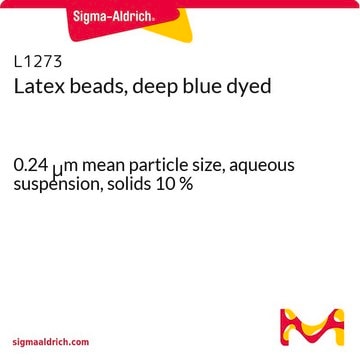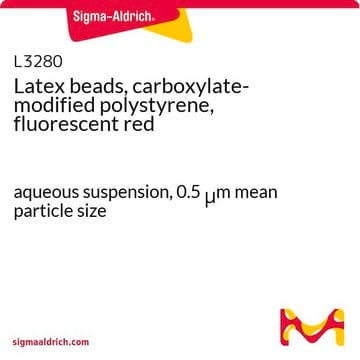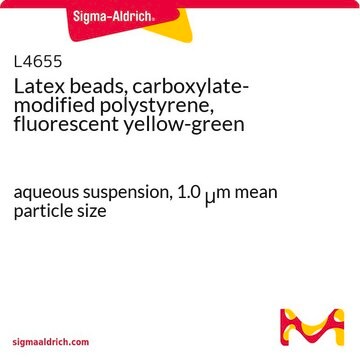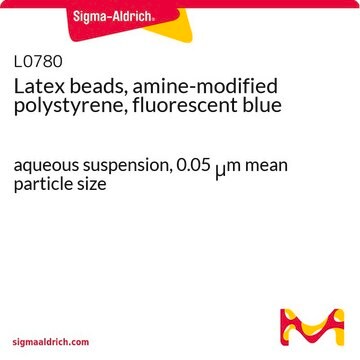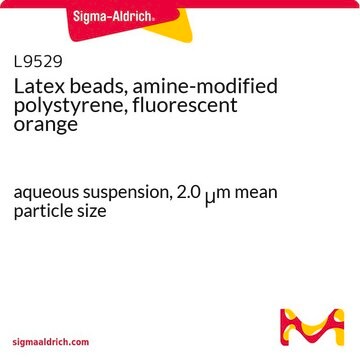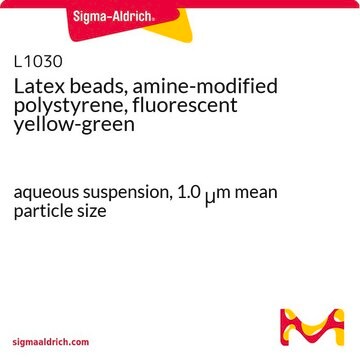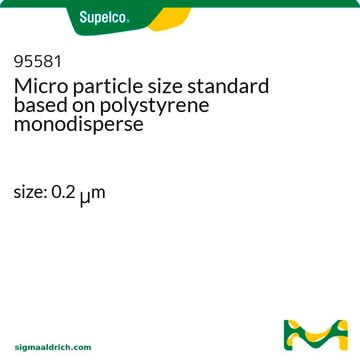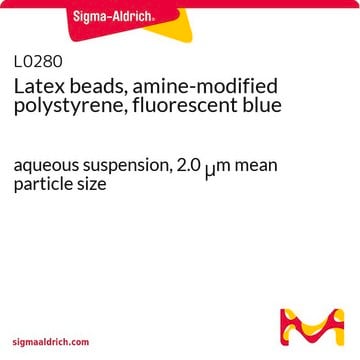L1148
Latex beads, deep blue dyed
0.055 μm mean particle size, aqueous suspension, solids 10 %
Se connecterpour consulter vos tarifs contractuels et ceux de votre entreprise/organisme
About This Item
Produits recommandés
Forme
aqueous suspension
Niveau de qualité
Composition
solids, 10%
Taille moyenne des particules
0.055 μm
Vous recherchez des produits similaires ? Visite Guide de comparaison des produits
Application
Latex beads have been used to study the regulation of primary mesenchyme cell migration in the sea urchin embryo and to gain a better understanding of the role of ecto-NAD+ glycohydrolase, an enzyme predominantly associated with phagocytic cells. Latex beads have also been used to develop a new technique for measuring the plaque-forming cell (PFC) responses to bacterial antigens.
Caractéristiques et avantages
Dye incorporated into beads, not surface-linked
Code de la classe de stockage
12 - Non Combustible Liquids
Classe de danger pour l'eau (WGK)
WGK 3
Point d'éclair (°F)
Not applicable
Point d'éclair (°C)
Not applicable
Certificats d'analyse (COA)
Recherchez un Certificats d'analyse (COA) en saisissant le numéro de lot du produit. Les numéros de lot figurent sur l'étiquette du produit après les mots "Lot" ou "Batch".
Déjà en possession de ce produit ?
Retrouvez la documentation relative aux produits que vous avez récemment achetés dans la Bibliothèque de documents.
Les clients ont également consulté
Gary G Martin et al.
The Biological bulletin, 211(3), 275-285 (2006-12-21)
Peritrophic membranes (PTMs) are secreted acellular layers that separate ingested materials from the gut epithelium in a variety of invertebrates. In insects and crustaceans, PTMs are produced in the midgut trunk (MGT, or intestine), but the MGT in decapod crustaceans
C D Muller et al.
Biology of the cell, 68(1), 57-64 (1990-01-01)
In order to gain a better understanding of the role of ecto-NAD+ glycohydrolase, an enzyme predominantly associated with phagocytic cells, we have studied its fate in murine macrophages (splenic, resident peritoneal and Kupffer cells) during phagocytosis of opsonized on mannosylated
C A Ettensohn et al.
Developmental biology, 117(2), 380-391 (1986-10-01)
After their ingression, the primary mesenchyme cells (PMCs) of the sea urchin embryo migrate within the blastocoel, where they eventually become arranged in a characteristic ring-like pattern. To gain information about how the movements of the PMCs are regulated, a
O Bagasra et al.
Journal of immunological methods, 49(3), 283-292 (1982-03-26)
A new latex bead technique for measuring the plaque-forming cell (PFC) responses to bacterial antigens is described. This technique has been designed for the study of antigens that cannot be readily coated onto SRBC but may also used for antigens
Delfine Cheng et al.
Micron (Oxford, England : 1993), 132, 102851-102851 (2020-02-25)
Kupffer cells are liver-resident macrophages that play an important role in mediating immune-related functions in mammals and humans. They are well-known for their capacity to phagocytose large amounts of waste complexes, cell debris, microbial particles and even malignant cells. Location
Notre équipe de scientifiques dispose d'une expérience dans tous les secteurs de la recherche, notamment en sciences de la vie, science des matériaux, synthèse chimique, chromatographie, analyse et dans de nombreux autres domaines..
Contacter notre Service technique